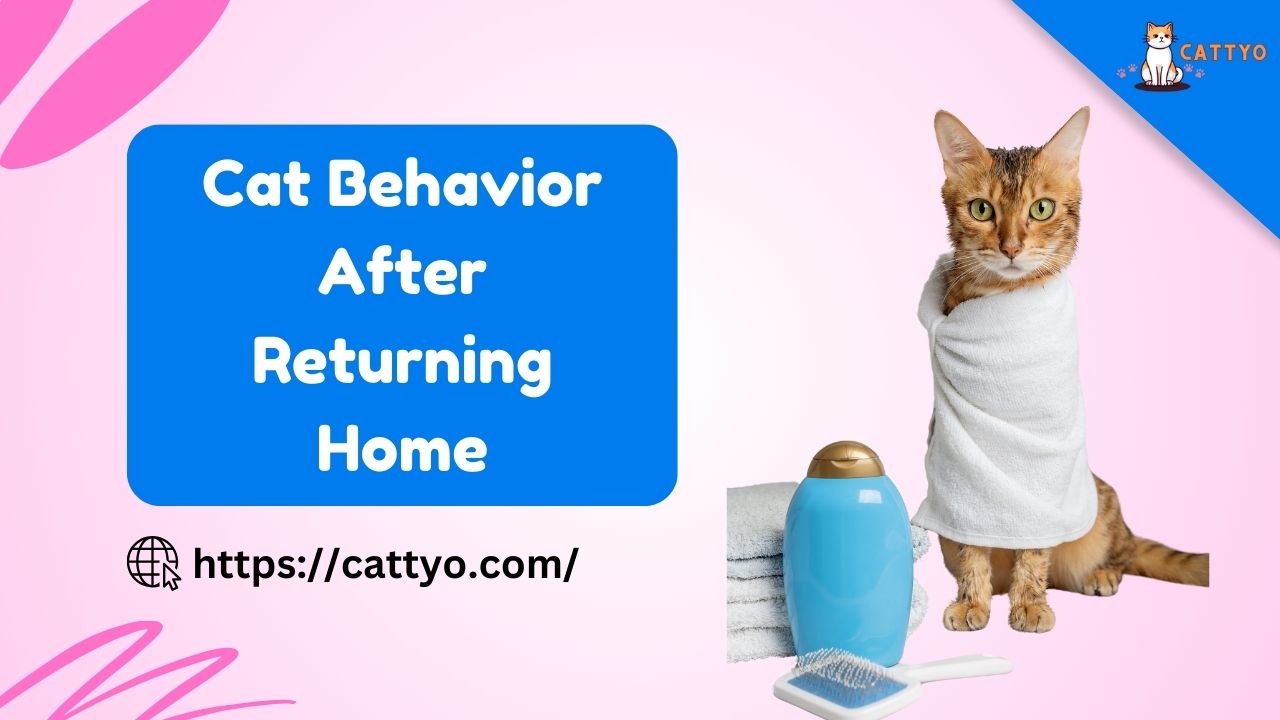Ever wondered why your cat acts so… weird when they come home after a trip to the vet, a few days at a pet sitter’s, or even just an afternoon away from you? One minute, they’re purring and rubbing up against your legs, and the next they’re darting around the house like they’re in a high-speed chase. What gives?
Cats are creatures of habit, but also full of contradictions. One moment they’ll act like they’ve missed you terribly, and the next they’ll be eyeing you with what could be described as either disdain or a subtle power move.
Returning home after a stint of being elsewhere—whether it’s a few hours or a few days—can elicit a variety of cat behaviors that can seem perplexing, even to the most experienced cat owner. But don’t worry; we’ve got you covered.
Cat Behavior After Returning Home
After being away, cats typically display a variety of behaviors as they readjust to their environment.
Upon entering, they may begin sniffing around, reacquainting themselves with their surroundings and marking their territory with scent glands located on their cheeks, paws, and face. This is a natural way for cats to feel secure and reassert control over their space.
Some cats will immediately seek affection, rubbing against their owner’s legs or sitting close for reassurance.
Others may be more cautious, exploring their environment slowly or retreating to a favorite resting spot. If they’ve been gone for a while, they might show extra signs of clinginess or dependence, wanting more attention and interaction to reinforce their bond.
In some cases, cats may also exhibit temporary changes in appetite, sleeping patterns, or even vocalizations as they readjust.
This behavior is normal and often a result of their need for stability and comfort after an absence. When cats return home, they often engage in several behaviors to reorient themselves:
- Scent Marking – They may rub against furniture or walls to mark their territory and feel secure.
- Exploration – Cats typically explore their environment, checking familiar spots to ensure everything is as it should be.
- Seeking Comfort – Some will seek affection from their owners for reassurance, while others may prefer solitude.
- Cautiousness – If the absence was long, they might be more reserved or hide for a while.
- Appetite Changes – Eating habits may vary, with some eating more or less than usual.
- Increased Clinginess – Some cats may become more affectionate, following their owners or seeking extra attention.
These behaviors reflect a cat’s need to feel safe and readjust to their home environment.
The Warm Welcome (or Not)
Let’s start with the basics. How do cats typically behave when they come back home? Well, that depends. You might find them hiding under the bed, giving you the side-eye. Or, they could be rubbing up against you, chirping with delight. It’s a little like a game of cat roulette—what kind of reaction will you get today?
1. The “I Missed You So Much” Moment
Some cats can’t get enough of you after being away. They might greet you at the door, jump on your lap, and follow you around like your personal shadow.
Cats are known for being independent, but they are also creatures of routine. The familiarity of you and your home brings them comfort, and after a separation, they’ll let you know how much they appreciate your presence.
One of my cats, Luna, is a perfect example. Every time I come home from a trip, she’ll run up to me, start purring loudly, and immediately flop down on my feet. It’s like a cat’s version of a “welcome home” party, minus the balloons and confetti.
2. The “I’m Going to Ignore You for a While” Act
Then, there’s the opposite side of the spectrum. Some cats are a little more standoffish. They might wander into the room, glance at you, and go right back to whatever they were doing—like, say, licking their paw with a look that says, “Yeah, I noticed you, but I’m just fine.”
What’s going on here? It could be a defense mechanism. If your cat’s been stressed out—whether by the car ride, the vet visit, or just being left behind—they might need some time to decompress.
It’s not personal; they just need their space to feel safe again. Think of it like someone giving you the cold shoulder after you’ve been away for too long. You’d need a moment, too, right?
The Strangeness of Territory
Cats are territorial animals. So, after a stint away, it’s not just about you—it’s about their territory, too. When they return home, they might need to reassert their claim on their space.
Ever seen your cat sniffing the corners of every room, rubbing their face on furniture, or even scratching up the place like they’re marking it all over again? It’s like their way of saying, “Yep, still mine. All mine.”
Don’t be surprised if they do a quick reconnaissance of the house. It’s their way of making sure everything’s in order after the disruption.
If you’ve had a new person in your home, a guest, or even just a change in furniture arrangement, your cat might be a little more cautious or curious than usual.
The Post-Vet or Post-Boarding Behavior
If your cat’s return follows a trip to the vet or a stay at the boarding facility, you might notice some odd behavior. A trip to the vet can be traumatizing for even the most stoic of cats.
They often return home smelling like a mix of antiseptic and strange animals. Your cat may act a bit off for a while, either by hiding or acting overly clingy. They might be trying to shake off the memory of that unpleasant experience.
One time, after Luna got spayed, she came home and immediately went to the spot where she usually sleeps.
She didn’t want to be touched, and it was clear she was still processing the experience. She didn’t want to play, didn’t want to cuddle. Just a few hours of “leave me alone” behavior. But after a little while, she came around and was back to her usual self.
The “Zoomies”
And then there’s the famous cat zoomies. After returning home, especially after being away, some cats get this burst of energy that results in what can only be described as a wild, unhinged sprinting session.
One minute, they’re lying around, all calm and collected. The next, they’re tearing through the house like a tiny, furry tornado.
This sudden burst of speed can be attributed to the pent-up energy and stress from being out of their usual environment.
It’s like a release, as if they’ve been holding it all in while they were away. The zoomies are their way of letting loose and reclaiming control over their space.
Table Of Quick Summary of Cat Behaviors After Returning Home
| Behavior | What It Means |
|---|---|
| Purring and Clinginess | They’ve missed you and want attention. |
| Ignoring You/Withdrawing | They need time to decompress or feel stressed. |
| Sniffing and Rubbing Around | They’re reasserting their territory. |
| Being Quiet and Standoffish | They might be recovering from stress or illness. |
| Zoomies | Release of pent-up energy after being away. |
FAQS On Cat Behavior After Returning Home
Q: Why does my cat act so weird after coming home from the vet?
A: It’s normal! Vet visits can be stressful for cats, so they may act distant or clingy after they return. They might also need to readjust to their home scent, especially if they’ve been exposed to unfamiliar smells at the vet.
Q: Is it bad if my cat seems to be ignoring me after being gone for a while?
A: Not necessarily. Cats are independent creatures, and while some will greet you with enthusiasm, others may need time to feel comfortable again. Give them space and time to settle back into their routine.
Q: Should I be concerned if my cat runs around the house after I come home?
A: Nope! The zoomies are a normal (and sometimes hilarious) cat behavior. It’s just their way of blowing off some steam after the stress of being away.
Q: How can I help my cat feel more comfortable after being away?
A: Provide a quiet, safe space for them to relax. Give them time to adjust to their surroundings, and offer extra cuddles or playtime if they seem to want it.
Wrapping Up
So, the next time you come home to a weird mix of purring, hiding, zooming, and sniffing, don’t panic. Your cat’s just going through their own version of a homecoming routine.
Whether it’s a burst of excitement, a need for reassurance, or a simple desire to reclaim their turf, cats have a lot of different ways of processing the return to their home base.
At the end of the day, they may not always express it in ways we expect, but they do miss us—just in their own quirky way.





